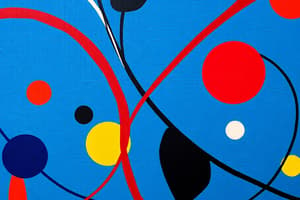Podcast
Questions and Answers
What does 'form' in art refer to?
What does 'form' in art refer to?
- A two-dimensional shape
- A three-dimensional object with volume (correct)
- A flat area enclosed by lines
- The surface quality of an object
Which property of color describes its brightness?
Which property of color describes its brightness?
- Saturation
- Hue
- Intensity (correct)
- Value
What is the role of value in art?
What is the role of value in art?
- To indicate the distance of objects
- To define the shape of an object
- To introduce temperature to colors
- To create contrast and emphasis (correct)
What type of space is characterized as the area around an object?
What type of space is characterized as the area around an object?
What does the principle of balance in art refer to?
What does the principle of balance in art refer to?
How does texture affect a work of art?
How does texture affect a work of art?
Which of the following describes the definition of pattern in art?
Which of the following describes the definition of pattern in art?
What does 'shape' refer to in the context of art?
What does 'shape' refer to in the context of art?
Which of the following best defines 'form' in the context of art?
Which of the following best defines 'form' in the context of art?
What is the primary distinction between 'line' and 'shape' in art?
What is the primary distinction between 'line' and 'shape' in art?
Which element of art is defined as a two-dimensional, flat area enclosed by lines or edges?
Which element of art is defined as a two-dimensional, flat area enclosed by lines or edges?
Which of the following describes the element of art known as 'value'?
Which of the following describes the element of art known as 'value'?
Which of these elements of art can influence the perception of depth in a piece?
Which of these elements of art can influence the perception of depth in a piece?
What is an example of a geometric shape in art?
What is an example of a geometric shape in art?
How can 'texture' enhance an artwork?
How can 'texture' enhance an artwork?
Which of the following elements is NOT typically associated with the principles of design?
Which of the following elements is NOT typically associated with the principles of design?
What is meant by symmetrical balance in art?
What is meant by symmetrical balance in art?
How can emphasis be achieved in an artwork?
How can emphasis be achieved in an artwork?
In what way does radial balance affect an artwork?
In what way does radial balance affect an artwork?
What might indicate a lack of balance in an artwork?
What might indicate a lack of balance in an artwork?
Which artist is known for effectively using emphasis in their work, particularly in The Last Supper?
Which artist is known for effectively using emphasis in their work, particularly in The Last Supper?
What is a characteristic of asymmetrical balance?
What is a characteristic of asymmetrical balance?
What is emphasized when an artwork successfully uses contrast?
What is emphasized when an artwork successfully uses contrast?
Which type of balance is represented by a mandala?
Which type of balance is represented by a mandala?
Flashcards are hidden until you start studying
Study Notes
Elements of Art
- Line: A continuous mark made on a surface, varying in width and direction. It can be straight, curved, horizontal, vertical, diagonal, or implied.
- Shape: A two-dimensional area enclosed by lines or edges. Shapes can be geometric or organic in form.
- Form: Refers to three-dimensional objects that possess volume and thickness, often creating perspective in artwork.
- Value: The lightness or darkness of a color, essential in creating contrast, emphasis, and perceived depth.
- Texture: The surface quality of an object, which can be both seen and felt, contributing to the overall experience of the artwork.
- Color: Known as hue, it adds mood and interest. Its three properties are hue (color name), intensity (brightness), and value (lightness/darkness).
- Space: Refers to the area within, around, or between objects, which can be positive (the object itself) or negative (surrounding space). Perspective gives an illusion of depth.
Principles of Art
- Pattern: Involves the visual arrangement of elements in a repetitive form or intelligible sequence.
- Balance: The distribution of visual weight in artwork, categorized into:
- Symmetrical Balance: Identical mirror images on both sides.
- Asymmetrical Balance: Different elements that still create a sense of balance.
- Radial Balance: Elements radiate from a central point.
- Emphasis: Techniques to draw attention to the main subject or focal point in artwork, achievable through contrast, placement, color, or size. For example, in Leonardo da Vinci's "The Last Supper," Jesus is emphasized through placement and converging lines.
Cultural Art Insights
- Thai silk is notable for its luxurious texture and is traditionally made from the silk of Thai silkworms.
- The Krama of Cambodia is a traditional scarf utilized for various practical and cultural purposes.
- The art of Southeast Asia reflects diverse cultural influences, including ethnic groups and mythology, showcased through various forms such as dance and pottery.
Objectives for Study
- Appreciate the attire and accessories of people from different Asian countries.
- Understand belief systems, values, and practices of various Asian cultures.
- Create an artwork inspired by the arts of Southeast Asia.
Studying That Suits You
Use AI to generate personalized quizzes and flashcards to suit your learning preferences.




